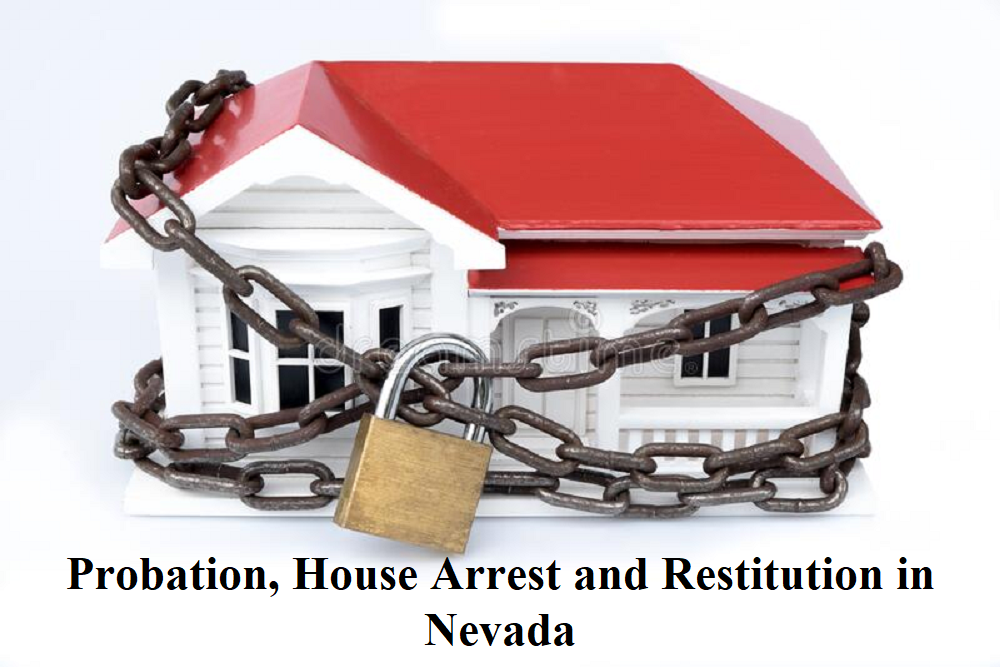Misdemeanor Probation aka “Stay out of Trouble”
Probation in misdemeanor cases is governed by NRS 4.373 (Justice Courts) and NRS 5.055 (Municipal Courts). The relevant provisions from each statute virtually track one another and provide that a justice of the peace, or municipal court judge, may suspend the sentence of any DUI defendant convicted of a misdemeanor offense. Both statutes also provide that the sentence of the defendant may not be suspended for a period longer than two years. Both statutes also permit the respective judge to place the following conditions on a defendant’s suspended sentence:
(a) Make restitution to the owner of any property that is lost, damaged or destroyed as a result of the commission of the offense;
(b) Engage in a program of community service, for not more than 200 hours;
(c) Actively participate in a program of professional counseling at the expense of the offender;
(d) Abstain from the use of alcohol and controlled substances;
(e) Refrain from engaging in any criminal activity;
(f) Engage or refrain from engaging in any other conduct, or comply with any other condition, deemed appropriate by the [judge];
(g) Submit to a search and seizure by the chief of a department of alternative sentencing, an assistant alternative sentencing officer or any other law enforcement officer at any time of the day or night without a search warrant; and
(h) Submit to periodic tests to determine whether the offender is using a controlled substance or consuming alcohol.
Both statutes permit the respective judges to condition any suspended jail sentence on the defendant “refrain[ing] from engaging in any criminal activity.” The foregoing condition is routinely referred to as a “stay out of trouble” term. Additionally, the judge may order that status reports on the defendant’s sentence compliance be provided as often as the judge deems appropriate. Provided the defendant complies with their probation sentence terms, the judge may vacate any suspended jail sentence and “the sentence may be reduced to not less than the minimum period of confinement established for the offense.” Finally, both statutes also provide the respective courts to “issue a warrant for the arrest of an offender who violates or fails to fulfill a condition of suspension.”
If the defendant violates a condition of his probation, the court then schedules a “revocation” hearing and may:
[m]odify the conditions of the suspension of the sentence;
[m]odify and extend the suspension of the sentence, in whole or in part, for a period of not more than 1 year after the date on which the court finds that the probationer has committed the violation, unless a longer period is authorized by specific statute; and/or
[r]evoke the suspension of the sentence, in whole or in part, and cause all or part of the sentence to be executed.
Although misdemeanor (“stay out of trouble”) revocation proceedings are less formal than felony (probation) revocation proceedings, Nevada law still requires the government to prepare a written report concerning the alleged violation.
After making an arrest, the chief, assistant, or other peace officer shall immediately notify the court of the arrest of the probationer . . . and shall submit a written report setting forth the act that constituted a violation of a condition of the suspended sentence . . .
Nevada law defines a “probationer” to be “a person who has been convicted of a misdemeanor, who . . . [h]as had his or her sentence suspended . . . or [h]as been sentenced to a term of residential confinement.” Prior to a justice of the peace or municipal court judge “revoking” a misdemeanor defendant’s probation, “the court shall provide the probationer . . . with notice of the proposed action and an opportunity to be heard.”
Residential Confinement aka House Arrest
Nevada’s DUI laws are pretty specific about residential confinement also known as house arrest. First and foremost, Nevada law does not expressly permit house arrest in lieu of the mandatory-minimum two days in jail for misdemeanor first offenders. However, the same statute does provide community service (48 to 96 hours) as an alternative punishment to the mandatory-minimum two days in custody. Jail time or house arrest are very rare sentence terms in misdemeanor DUI plea deals. Although every jurisdiction is different, most misdemeanor DUI plea deals will involve credit for any required/remaining jail time. Although Nevada law does not expressly permit house arrest in lieu of the mandatory-minimum two days for first offenders, in my experience, most judges will approve a negotiated deal that converts any remaining time on the mandatory two days to house arrest time. However, every jurisdiction has its own conversion formula. While some judges will approve a “day for day” conversion, other jurisdictions will sentence defendants to four days of house arrest for every one day of incarceration.
Next, Nevada law does permit house arrest in lieu of the mandatory-minimum ten days in custody for misdemeanor second offenders. However, except for felony third-offenders, no other felony DUI-offender is permitted house arrest as an alternative to incarceration. Moreover, the house arrest that is permitted with felony third-offenders is only permitted if the defendant is accepted into “a program of treatment for an alcohol or other substance use disorder for at least 3 years.” However, in general, Nevada law permits a judge “in lieu of imposing any punishment other than a minimum sentence required by statute . . . may sentence a person convicted of a misdemeanor to a term of residential confinement.” “In making this determination, the [judge] . . . shall consider the criminal record of the convicted person and the seriousness of the crime committed.” With any house arrest sentence, the judge:
shall . . . [r]equire the convicted person to be confined to his or her residence during the time the convicted person is away from his or her employment, public service or other activity authorized by the justice of the peace; and [r]equire intensive supervision of the convicted person, including, without limitation, electronic surveillance and unannounced visits to his or her residence or other locations where the convicted person is expected to be to determine whether the convicted person is complying with the terms of his or her sentence.
House arrest sentences can involve mandated submissions to “search and seizure” without search warrants and, significantly, random alcohol or substance testing. Nevada law also permits an “electronic device [to] be used to supervise a convicted person sentenced to a term of residential confinement.” Significantly, judges have the discretion “at any time, [to] modify the terms and conditions of the residential confinement.” Whether the defendant’s case is pending in a justice court or a municipal court,
[i]f it is determined that the convicted person violated any term or condition of the convicted person’s residential confinement, the sentence may be rescinded, modified, or continued. If it is rescinded, another punishment authorized by law must be imposed.
Restitution in Nevada
Black’s Law Dictionary defines “restitution” as “compensation for loss; esp., full or partial compensation paid by a criminal to a victim, not awarded in a civil trial for tort, but ordered as part of a criminal sentence or as a condition of probation.” The most important thing for a DUI practitioner to remember is that Nevada law only permits restitution to be awarded to the actual victim of the offense. On numerous occasions, I have had prosecutors ask my client to repay the “victim’s” insurance company under the guise of restitution. This is not allowed. The insurance company is not the “victim” of property damage or medical bills paid under a contractual insurance policy. “[A] sentencing court may not order a defendant to pay restitution to an insurance company for the company’s payment of a claim by or on behalf of a crime victim.” If a prosecutor requests restitution in car accident cases, make sure to discover whether applicable policies exist and/or whether property repair/medical costs have already been covered by an insurance company.
The right to restitution is typically set forth by a particular statute (especially in Federal Court). There is no Nevada statute concerning restitution in a DUI case. In general, Nevada law provides as follows:
[i]f a sentence of imprisonment is required or permitted by statute, the court shall . . . [i]f restitution is appropriate, set an amount of restitution for each victim of the offense and for expenses related to extradition in accordance with NRS 179.225.
Nevada’s principal restitution statute, therefore, provides that restitution can be granted if the Court deems the same “appropriate.” Most federal cases, citing to specific federal restitution statutes, discuss a “preponderance of the evidence” standard. Nevada statutory law also expressly authorizes restitution in misdemeanor cases. Both justices of the peace (Justice Courts) as well as municipal court judges (Municipal Courts) are authorized to order, “if the circumstances warrant [and] as a condition of suspension . . . that the offender . . . [m]ake restitution to the owner of any property that is lost, damaged or destroyed as a result of the commission of the offense.” Finally, under Nevada law, a criminal judgment that requires a defendant to pay restitution “constitutes a lien in like manner as a judgment for money rendered in a civil action.” Moreover, “[a] judgment which requires a defendant to pay restitution . . . [m]ay be recorded, docketed and enforced as any other judgment for money rendered in a civil action [and] [d]oes not expire until the judgment is satisfied.” Finally, “[a]n independent action to enforce a judgment which requires a defendant to pay restitution may be commenced at any time.” Thus, restitution ordered in a DUI case is even more powerful than a civil judgment for the same damages.
If you or a loved one have any questions about probation, house arrest, and/or restitution in a misdemeanor criminal matter, please contact the Las Vegas DUI lawyers at HAYES WAKAYAMA for a free and confidential consultation.

